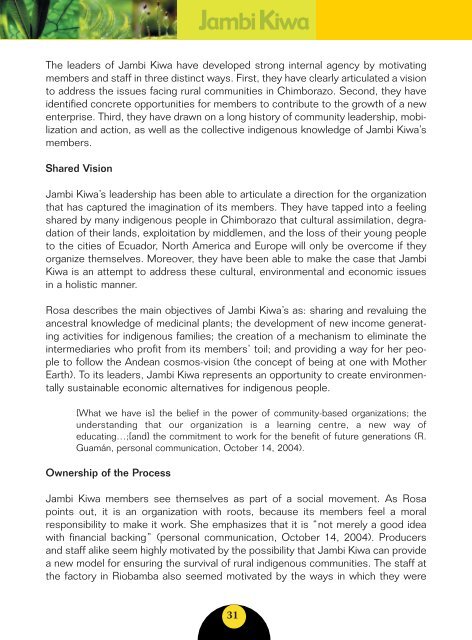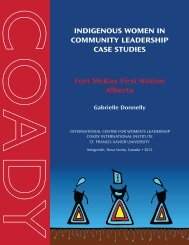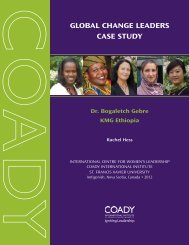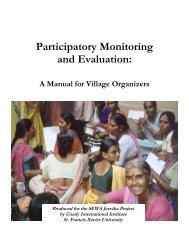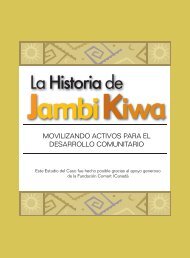Rosa's Story - Coady International Institute - St. Francis Xavier ...
Rosa's Story - Coady International Institute - St. Francis Xavier ...
Rosa's Story - Coady International Institute - St. Francis Xavier ...
Create successful ePaper yourself
Turn your PDF publications into a flip-book with our unique Google optimized e-Paper software.
The leaders of Jambi Kiwa have developed strong internal agency by motivating<br />
members and staff in three distinct ways. First, they have clearly articulated a vision<br />
to address the issues facing rural communities in Chimborazo. Second, they have<br />
identified concrete opportunities for members to contribute to the growth of a new<br />
enterprise. Third, they have drawn on a long history of community leadership, mobilization<br />
and action, as well as the collective indigenous knowledge of Jambi Kiwa’s<br />
members.<br />
Shared Vision<br />
Jambi Kiwa’s leadership has been able to articulate a direction for the organization<br />
that has captured the imagination of its members. They have tapped into a feeling<br />
shared by many indigenous people in Chimborazo that cultural assimilation, degradation<br />
of their lands, exploitation by middlemen, and the loss of their young people<br />
to the cities of Ecuador, North America and Europe will only be overcome if they<br />
organize themselves. Moreover, they have been able to make the case that Jambi<br />
Kiwa is an attempt to address these cultural, environmental and economic issues<br />
in a holistic manner.<br />
Rosa describes the main objectives of Jambi Kiwa’s as: sharing and revaluing the<br />
ancestral knowledge of medicinal plants; the development of new income generating<br />
activities for indigenous families; the creation of a mechanism to eliminate the<br />
intermediaries who profit from its members’ toil; and providing a way for her people<br />
to follow the Andean cosmos-vision (the concept of being at one with Mother<br />
Earth). To its leaders, Jambi Kiwa represents an opportunity to create environmentally<br />
sustainable economic alternatives for indigenous people.<br />
[What we have is] the belief in the power of community-based organizations; the<br />
understanding that our organization is a learning centre, a new way of<br />
educating…;[and] the commitment to work for the benefit of future generations (R.<br />
Guamán, personal communication, October 14, 2004).<br />
Ownership of the Process<br />
Jambi Kiwa members see themselves as part of a social movement. As Rosa<br />
points out, it is an organization with roots, because its members feel a moral<br />
responsibility to make it work. She emphasizes that it is “not merely a good idea<br />
with financial backing” (personal communication, October 14, 2004). Producers<br />
and staff alike seem highly motivated by the possibility that Jambi Kiwa can provide<br />
a new model for ensuring the survival of rural indigenous communities. The staff at<br />
the factory in Riobamba also seemed motivated by the ways in which they were<br />
31


